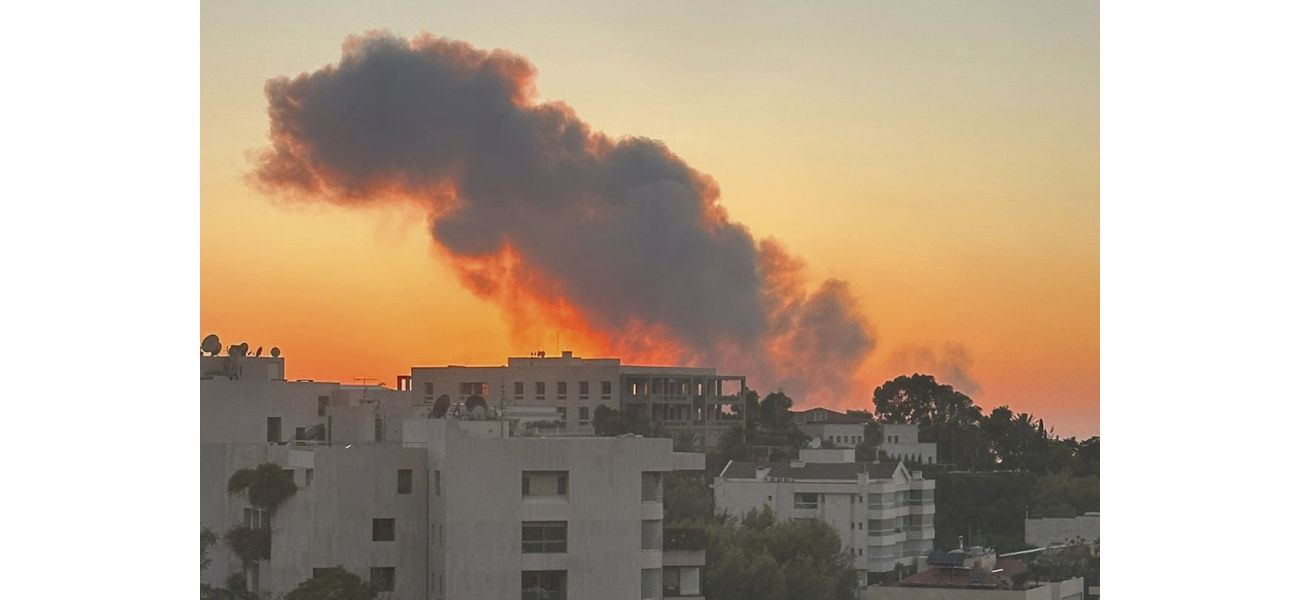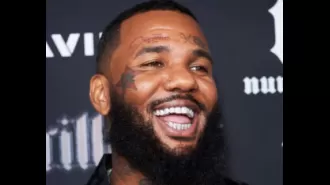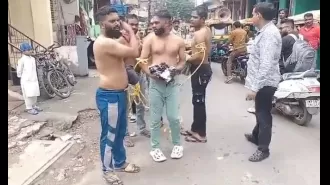Israel reports attacking Hezbollah's main base in Lebanon.
Explosions destroy Beirut, creating clouds of smoke in the sky.
September 27th 2024.

On Friday, the Israeli military announced that they had targeted Hezbollah's central headquarters in Beirut. The strikes caused massive explosions that destroyed multiple buildings and sent plumes of smoke into the sky. These attacks came shortly after Israeli Prime Minister Benjamin Netanyahu's address to the UN, where he declared that Israel's campaign against Hezbollah would continue. This further dimmed hopes for a potential cease-fire that could prevent a full-scale war.
At this time, there is no information available about any casualties from the strikes. However, it is clear that Israel is determined to eliminate Hezbollah's top leaders, which is something that has not been seen in previous conflicts. Just before the explosions, thousands of people had gathered in another part of Beirut for the funeral of three Hezbollah members who were killed in earlier attacks, including the head of the group's drone unit.
The bombings on Friday were the strongest and most powerful ones seen in Beirut in the past year. According to the Israeli army spokesman, Rear Adm. Daniel Hagari, the main Hezbollah headquarters, located beneath residential buildings, was the main target. As a result, four buildings in the Haret Hreik neighborhood of Dahiyeh were completely destroyed, as reported by Hezbollah's Al-Manar TV. The blast was strong enough to rattle windows and shake houses in a 30-kilometer radius, and ambulances were immediately dispatched to the scene.
Israel has significantly ramped up its airstrikes in Lebanon this week, with the goal of ending the 11-month-long attacks from Hezbollah into their territory. The exact extent of Israel's operation is still uncertain, but there have been talks of a possible ground invasion to push Hezbollah away from the border. In preparation for this, Israel has moved thousands of troops towards the border.
The death toll in Lebanon this week has risen to over 720, with at least 25 people being killed in Israeli strikes early on Friday, according to Health Minister Firass Abiad. The casualties include women and children, and in one strike, nine members of the same family were killed. The Israeli security official believes that a potential war against Hezbollah would not last as long as the one in Gaza, as their goals are more focused on pushing the militant group away from the border.
In response to these attacks, Hezbollah has continued to fire rockets into Israel, showing their support for the Palestinians. This has resulted in a daily exchange of fire between Israel and Hezbollah, leading to tens of thousands of people being forced to flee their homes on both sides of the border.
The Israeli military has stated that they carried out dozens of strikes in southern Lebanon on Friday, targeting Hezbollah's rocket launchers and infrastructure. They also claimed that Hezbollah had fired rockets towards the northern Israeli city of Tiberias. In the southern Lebanese city of Tyre, two women were killed when a building they were in was hit by an Israeli strike.
Despite the heavy damage inflicted on Hezbollah's weapons capabilities and the assassination of several of its top commanders, the group remains defiant. At a funeral in Dahiyeh before the explosions, thousands of supporters marched behind the coffins of the three Hezbollah members, chanting and waving their fists in the air. Hussein Fadlallah, the head of Hezbollah in Beirut, stated that the group has endless numbers of experienced fighters and will continue to support Palestine and Gaza until Israel ends its offensive. He also warned that there is no place for neutrality in this battle.
At this time, there is no information available about any casualties from the strikes. However, it is clear that Israel is determined to eliminate Hezbollah's top leaders, which is something that has not been seen in previous conflicts. Just before the explosions, thousands of people had gathered in another part of Beirut for the funeral of three Hezbollah members who were killed in earlier attacks, including the head of the group's drone unit.
The bombings on Friday were the strongest and most powerful ones seen in Beirut in the past year. According to the Israeli army spokesman, Rear Adm. Daniel Hagari, the main Hezbollah headquarters, located beneath residential buildings, was the main target. As a result, four buildings in the Haret Hreik neighborhood of Dahiyeh were completely destroyed, as reported by Hezbollah's Al-Manar TV. The blast was strong enough to rattle windows and shake houses in a 30-kilometer radius, and ambulances were immediately dispatched to the scene.
Israel has significantly ramped up its airstrikes in Lebanon this week, with the goal of ending the 11-month-long attacks from Hezbollah into their territory. The exact extent of Israel's operation is still uncertain, but there have been talks of a possible ground invasion to push Hezbollah away from the border. In preparation for this, Israel has moved thousands of troops towards the border.
The death toll in Lebanon this week has risen to over 720, with at least 25 people being killed in Israeli strikes early on Friday, according to Health Minister Firass Abiad. The casualties include women and children, and in one strike, nine members of the same family were killed. The Israeli security official believes that a potential war against Hezbollah would not last as long as the one in Gaza, as their goals are more focused on pushing the militant group away from the border.
In response to these attacks, Hezbollah has continued to fire rockets into Israel, showing their support for the Palestinians. This has resulted in a daily exchange of fire between Israel and Hezbollah, leading to tens of thousands of people being forced to flee their homes on both sides of the border.
The Israeli military has stated that they carried out dozens of strikes in southern Lebanon on Friday, targeting Hezbollah's rocket launchers and infrastructure. They also claimed that Hezbollah had fired rockets towards the northern Israeli city of Tiberias. In the southern Lebanese city of Tyre, two women were killed when a building they were in was hit by an Israeli strike.
Despite the heavy damage inflicted on Hezbollah's weapons capabilities and the assassination of several of its top commanders, the group remains defiant. At a funeral in Dahiyeh before the explosions, thousands of supporters marched behind the coffins of the three Hezbollah members, chanting and waving their fists in the air. Hussein Fadlallah, the head of Hezbollah in Beirut, stated that the group has endless numbers of experienced fighters and will continue to support Palestine and Gaza until Israel ends its offensive. He also warned that there is no place for neutrality in this battle.
[This article has been trending online recently and has been generated with AI. Your feed is customized.]
[Generative AI is experimental.]
0
0
Submit Comment





